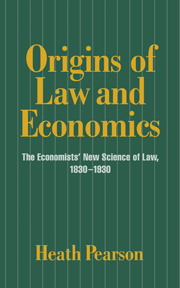Introduction
Published online by Cambridge University Press: 12 January 2010
Summary
How novel is the “new institutional economics”? Are there historical precursors to “constitutional economics”? What were the core assumptions of nineteenth-century European “historical economics,” and what was its relation to early twentieth-century American “institutionalism”? How, and to what extent, did materialist and humanist impulses commingle in early social evolutionism? How did economists and jurists view one another during the decades leading up to the contemporary “law and economics” movement? If these questions pique the reader's interest, read on.
By design or default, the legal order has not traditionally been included in the locus of economic explanation. To the extent that law is accorded attention at all, it is held to be an (exogenous) cause of economic outcomes, not an (endogenous) outcome of economic causes. We may illustrate with the classic example of private property and free contract. The canonical Principles of Economics text simply assumes these institutions as a point of departure. The question why people – and economies – behave diiferently under regimes of private and common property is also uncontroversially economic, if somewhat more recondite; but the question why private property emerges in one society, and not in another, has generally gone unexplored. As Paul Samuelson put it in his influential Foundations of Economic Analysis (1947: 8), the “governmental and institutional framework” should be set aside, along with tastes and technology, as “matters which economists have traditionally chosen not to consider within their province.”
The best argument for such neglect goes to simplicity, and to the principle of comparative advantage in the division of intellectual labor.
- Type
- Chapter
- Information
- Origins of Law and EconomicsThe Economists' New Science of Law, 1830–1930, pp. 1 - 4Publisher: Cambridge University PressPrint publication year: 1997



